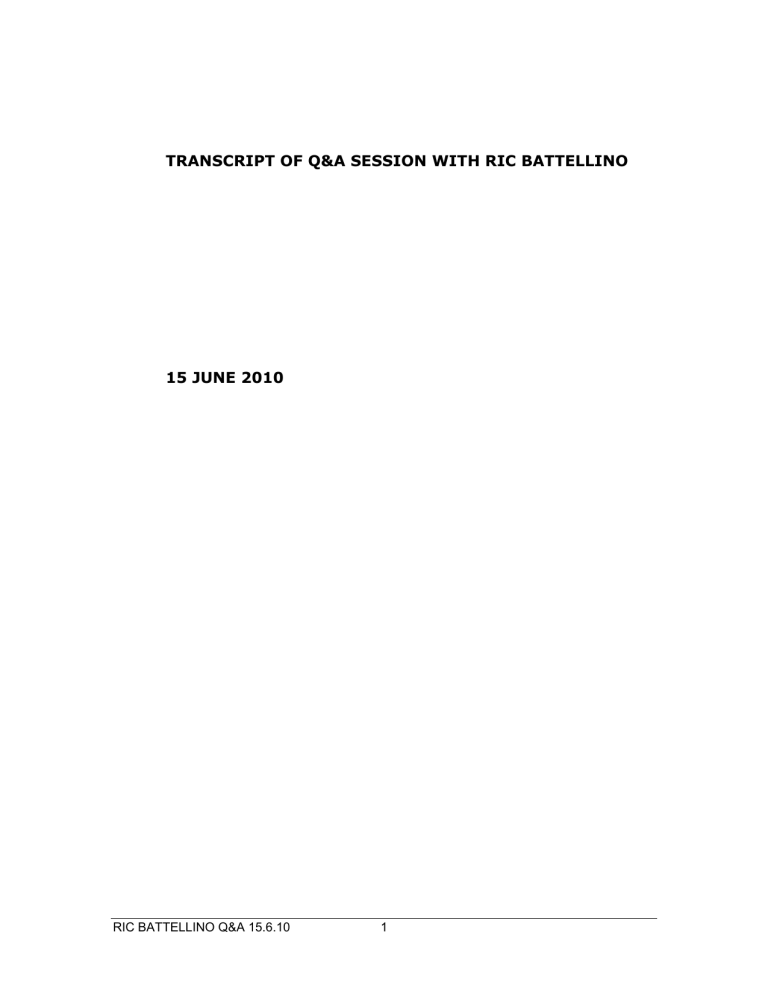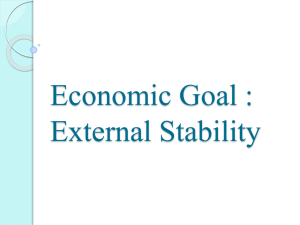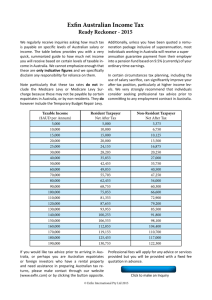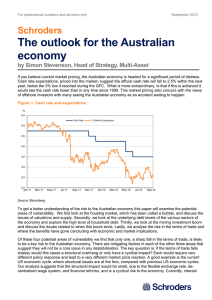TRANSCRIPT OF Q&A SESSION WITH RIC BATTELLINO 15 JUNE 2010

TRANSCRIPT OF Q&A SESSION WITH RIC BATTELLINO
15 JUNE 2010
RIC BATTELLINO Q&A 15.6.10 1
5
10
15
20
25
30
35
QUESTION: Thanks very much. That was very insightful. Just what would you see as the three key challenges, then, to upsetting the housing –the steady state of housing or rent in the economy today? So, if I were an offshore bank, for example, saying the level of housing debt is too high, what you would answer and say what are the three key challenges that they’d have that might actually cause it to be higher and upset it, if you like?
MR BATTELLINO: Upset it? Well, the biggest things that can go wrong are when economies falter quite badly. And the economy slows down and the unemployment rate starts to rise. So you’ve really got to keep an eye on things that could bring about that situation. But, having said that, even if there was some slowing in the economy, I think we’d be fairly confident that the household sector is in – or their finances are in - pretty good shape. As I say, you can look at the way that debt has been distributed. You know, most of the rise in debt is because households, for one reason or another, felt they had the capacity to gear up, buy more assets and basically make use of the capacity they had to service that debt.
So the fact that debt ratios here are very similar to most other countries – I think it suggests to me there’s nothing unusual happening. I sometimes wonder why it is that foreigners have such a view about Australian households. I think it’s partly – there’s probably two reasons for that. First of all, if you measure just the saving rate of households in Australia as measured from the national accounts, it tends to look quite low. It’s down there with United States. But that measure of saving for a household in Australia is not very meaningful because the Australian households essentially have most of their savings in securities-based products and, essentially, the Australian households own the corporate sector through their superannuation industries’ funds and, therefore, this means that you really have to combine – look to the savings of the household sector and the corporate sector combined. Australian households really save through their ownership of the corporate sector. And, as I said, for the country as a whole, the saving rate is actually very good.
The second issue is that of house prices. People feel that house prices in Australia are quite high, and that’s quite often because the ratio of house prices to income that are published for Australia tend to focus mainly on prices in the cities, and they are quite elevated. But, if you look across the whole country, the ratio of house prices to income is not that different from most other countries.
RIC BATTELLINO Q&A 15.6.10 2
5
10
15
20
25
30
35
QUESTION: Just on that topic, do you think that, with offshoring and jobs becoming more scarce locally, there’s a tendency for the cities to have all the jobs and, therefore, have all the demand for housing and create almost – what shall we say – like almost barren areas of property or barren areas where people aren’t really – they can’t get work in these areas where the housing prices are lower? Isn’t that a concern that housing prices are too high in the cities?
MR BATTELLINO: Well, the house prices in cities aren’t high relative to the income in the cities because most of the figures you see published on house prices to income
– what they do is they measure house prices in the city and express it as a proportion of income of the whole country. But, if you do house prices relative to the incomes of the people living in those areas, then the prices in the cities also are quite reasonable. But, as to the demographics as to where people end up living, I mean I can’t really sort of say much about that. But, clearly, there’s a lot of forces working there. Some work to pull people into the cities but there’s also forces that encourage people to move out into other parts of the country. So I’m not clear – it’s not clear to me where the balance will lie.
QUESTION: The Australian economy has showed a lot of resilience in this last GFC period with budget deficits turning around quicker than were expected; unemployment sort of peaked a lot lower than everyone expected. What’s your views on the impact of overseas debt and sovereign debt and the impact that might have on Australia? Is it a likelihood? And, if it does happen, our resilience to whether a – like, a second wave, so to speak.
MR BATTELLINO: Well, yeah, the events in Europe really are quite worrying because - one of the problems when you have governments in financial difficulty is there’s nobody there to bail out governments. I mean, if a government gets into trouble, it’s really – you’ve got to look at other governments or the IMF and the capacity – the bigger you are, the less capacity there is for somebody else to bail you out. So the developments in government debt are, I think, a worry because it’s not clear to me that they can be solved certainly any time soon and if they are going to be solved through fiscal tightening, that actually means some quite difficult periods ahead for some of these economies.
We’re fortunate here in Australia though that the region where we are – well, certainly Australia’s own government debt position is very good; we’ve one of the best in the world. But, all through the region where we are and our trading partners,
RIC BATTELLINO Q&A 15.6.10 3
5
10
15
20
25
30
35 government debt is not a problem. So we’re in this part of the world where, to the extent if we are going to be affected by these issues – and I suspect to some extent we will be – we’re in a part of the world which will be least affected by these. How serious is it going to be? I really can’t say. It depends on what measures are taken to deal with these issues and where it heads to from here.
QUESTION: The last month or two has been dominated by what’s been happening in Greece, and I suppose it’s been affecting world markets, and I note this morning that the Minutes of the RBA put interest rates on hold because of that uncertainty.
Do you think the governments over there have sorted that out and do you think we’re through it or do you think there will be some more countries like that which might have some issues in the months to come?
MR BATTELLINO: Well, just clarifying on the Minutes there, that was one of the factors the Board took into account. But, also, the more general issue is the fact that we’ve been through this tightening process for the last few months and we were very keen to get interest rates back to a more normal level, given the way the economy had evolved, and we basically feel we’ve done that. So that was really the key reason why we now feel we’ve got the flexibility, because of what we did in the past, to take some time to see how things evolve.
In terms of the situation in Greece, well, the starting position for these countries is so poor in terms of their finance that even very severe fiscal tightening still leaves them with big budget deficits. And I think that’s the thing that people are having trouble getting their minds around. How do you get out of it? Because I have to say these sort of issues are pretty well unprecedented and, to the extent they’ve arisen in the past, they’ve usually been associated with wars and they’ve usually ended up being sort of solved by periods of inflation, which has basically just inflated up the asset values of the economy. So there’s a lot of uncertainty as to how countries can deal with these issues.
QUESTION: I think Australia’s economy has done quite well with China in the last couple of years, and it sort of probably reduced the impact of the global financial crisis. Have we thought about – are we putting all our eggs in one basket? What if
China does deteriorate in the future? What’s Australia’s plan behind that as a plan B to counteract any significant impact on the Australian economy?
RIC BATTELLINO Q&A 15.6.10 4
5
10
15
20
25
30
35
MR BATTELLINO: Well, in recent years, I think Asia and China in particular have been a very significant force on our economy. But one of the things we noticed through the Asian financial crisis, if you go back to the late-‘90s, even at the point we had over half our exports – almost two-thirds of our exports were going to Asia even then. And so we had – all our major trading partners basically had this massive financial crisis, and you’d think that would have really affected the
Australian economy. But one thing we noticed is that, being a – one of the advantages that comes from being a commodity exporter is that it’s very easy to reorientate your markets. So, you can – my impression is that, if you’re a manufacturer or something, you have to have very sophisticated distribution channels and all sorts of things set up, whereas if you’re selling coal and iron ore and this customer now doesn’t want it, you just send the ship somewhere else. It’s pretty easy if you’re just selling into markets to redirect the product somewhere else.
So we were quite surprised through the Asian crisis how resilient our exports were through that period, given what happened to our trading partners.
So, there’s no doubt that, if China was to slow down – and I have to say, at the moment China is trying to slow down because their growth rate really picked up a lot late last year/early this year and so it is trying to slow down and, in some ways, I welcome that because I think it’s actually going to make our life here easier to have a more moderate growth rate in China. But, if it does slow down, it will have impacts on us, but I’m sure the economy will be able to weather that the way it has in the past. I mean, there will be other markets around.
QUESTION: For quite some time, the Reserve Bank has been concerned about the economy’s reliance on the resources market. With current slowdown in European markets potentially can also – the broader developing economies and initiation of
RSPT – would you please elaborate a bit more about the reliance on the mining sector for the Australian economy in the next few – say, five years? What will be the impact and what are the concerns? Thank you.
MR BATTELLINO: Well, you know, the broad fact here is Australia is having an unprecedented mining boom at the moment. Mining investment normally runs at about 1.5 per cent of GDP and, in a boom period – say, in the late-‘80s commodity boom – it got up to double that – 3 per cent – and that was a very significant boom.
At the moment, investment is already up to – mining investment is up to 4.5 per cent of GDP, so three times the normal rate, and all the projections are that it’s going to go a lot higher yet. If you start adding up all the projects that are
RIC BATTELLINO Q&A 15.6.10 5
5
10
15 scheduled around the place, it is going to be very strong. So the question is: how is the economy going to accommodate that sort of investment boom? And, when we look at how the economy has performed in the past through those periods, it’s pretty clear that those sort of booms have very significant impacts on the economy and do cause a lot of stresses and strains. They’re basically periods of very fast growth in economic activity and, broadly speaking, most parts of the economy benefit from that. But there are some sectors who do get affected by the wash of it all.
But, that’s really - I think, the challenge for the Australian economy for the next few years is going to be how to accommodate this mining boom that’s going on and the lessons from history are that, if you don’t maintain fairly disciplined economic policies through those periods, you can quickly get all sorts of distortions built up in the economy – inflation in particular – which end up causing a lot of problems in the economy. So it’s quite a challenge. It’s a good challenge to have, but it’s a challenge nonetheless.
RIC BATTELLINO Q&A 15.6.10 6






